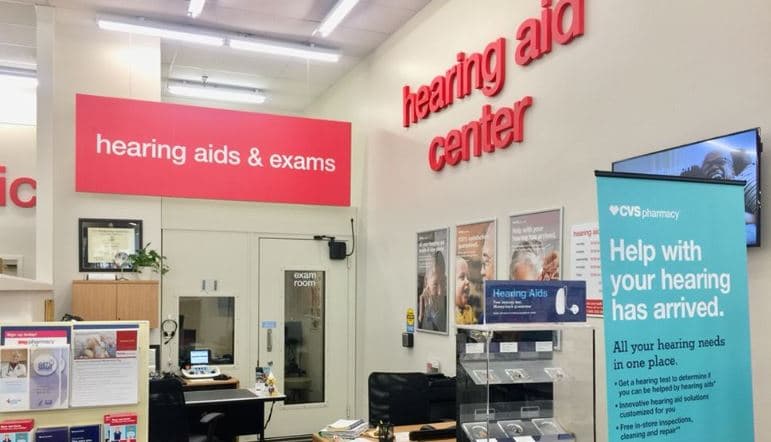With more than 440 Hearing Aid Centers in the U.S. and more than 560 worldwide, Costco dominates big-box hearing aid retailing. Their proven business model leverages extremely low cost of goods, near-zero marketing costs and the positive brand reputation of Costco to offer the latest high-quality hearing devices at extremely low prices. Given its double-digit share of the private pay hearing aid market, Costco is the envy of other large entities looking to venture into the lucrative chain-retail hearing aid business.
Duplicating Costco’s rise to dominance in hearing aid retailing, an overnight success more than 20-years in the making, has proven difficult for other large firms. The most recent example is CVS, the Rhode Island-based company is the largest pharmacy chain in the US. The multi-billion dollar firm boasts more than 9,600 locations in the US.
In 2017, while largely riding the coattails of their Minute Clinic growth, CVS made a big splash into hearing aid retailing by scaling their small footprint comprised of Hearing Centers in two regional markets (Ohio and Texas) into a nationwide chain with dozens of locations around the country.
All CVS Hearing Centers to Close Nationwide
This week, CVS’s grandiose plans to aggressively expand and compete head-to-head with Costco came to a screeching halt. According to multiple sources, including from both CVS employees and suppliers, the company is planning to completely shut down operations of its hearing aid clinics across the US by the end of March.
Based upon numerous discussions with sources close to the developments, hearing center employees were caught off guard this week and notified by conference call that the clinics would be ceasing operations by the end of March.
Update: CVS Responds to Request for Comment
After publication of our story, we received comments from CVS confirming that indeed the organization has decided to pull the plug on its dozens of hearing center locations across the US. The company cited lower cost direct to consumer hearing aids, such as the new OTC category of hearing aids that are expected to become available in the US in 2020.
“As part of CVS Pharmacy’s commitment to making health easier and more convenient for our customers, since 2015 we have piloted audiology services at a small number of CVS Pharmacy locations. However, the market for hearing care is evolving. The FDA is preparing to approve lower-cost, over- the-counter hearing devices in the near future, and new technology is emerging to enable self-serve hearing testing and care.
As such, we are shifting our audiology strategy to better position CVS Pharmacy as a leader in offering clinically effective, lower priced hearing devices once the new over-the-counter category is approved by the FDA. To help prepare for this shift, we are closing the standalone audiology centers in our retail locations, effective March 30, 2019″
–Erin Pensa, Senior Director of Retail Communications, CVS Pharmacy .







It should be noted that the entire staff of audiologists were laid off with a less than adequate severance. These highly trained professionals were lured from competitors and hired to build CVS’s hearing aid businesses from zero on the promise this was a strategic business initiative and long term position.
This is a correct move. It is not a shutdown, it is a change in approach. Hearing aids, as they are now, cannot provide a solution to the majority of hearing impaired. They are VERY expensive, make you look “special”, have limited functionality and require professional fitting. The new class of CE devices sometimes called Hearables that combines hearing enhancement and other functionalities may be an answer. Our company is developing such solutions under Wear & Hear brand name (www.wearandhear.con). BOSE with their Hearphones and NuHeara with IQbuds are other examples. There will more in a near future. Recently FDA granted de novo status to the unknown Bose self-fitting Hearing Aid that proves the concept. With our BeHear devices, user can do his/her hearing assessment that is very accurate. After that all sounds are modified to fit user’s hearing.
As such, this new type of devices can be sold OTC with a little, occasional help of sales people. No need to have dedicated hearing centers in pharmacies.
Many of your accusations about hearing aids and their functionality are blatantly false (and near offensive) and only perpetuate negative stereotypes about hearing aids. You have cited no sources to back your claims, and are only trying to promote your product which likely will not be nearly as effective as products backed by doctors.
Alexander Golden please describe what you mean by make ‘make you look special’. In your view , what is the limited functionality in hearing aids that describe. How does your company solve this issue with over the counter self fit?
Dear Anonymous,
I will be happy to provide a detailed answer to you, but, please, spell my name correctly and disclose your name so that I can address you properly.
Does anyone know what happened to the bundled services and warranty people purchased with their hearing aids?